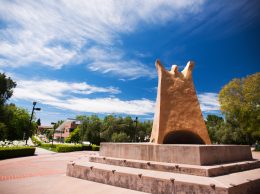By Ritch Eich on January 6, 2012
All too often the best-known person on a college campus is the football or basketball coach, not the campus president. And the most prominent place to be is the stadium, not the library. I suppose it is because many people prefer sports to books. But shouldn’t higher education represent something … well, higher?
A college education is a passport, a voucher to be exchanged for the journey of life where you can begin to make meaningful contributions to the community and the world. A university’s real purpose then should be to broadly educate students and prepare them for success in life, not entertain alumni and corporate friends at lavish tailgates and in ostentatious skyboxes. Something has gone wrong.
A quick return to the past may be instructive. It wasn’t long ago when leaders of our country’s universities were described in a New York Times article as cutting “striking figures on the public stage.” Clark Kerr at the University of California, Father Ted Hesburgh of Notre Dame, Robben Fleming at the University of Michigan, Steven Sample at the University of Southern California, John Hannah at Michigan State University, Derek Bok at Harvard and other real leaders weren’t afraid to address civil rights, the Vietnam War or the widening gulf between the “haves” and the “have nots.”
Fast forward to today. When is the last time a campus president spoke out on immigration, income equality, joblessness, health care or climate control? In short, where is the moral leadership, in words and action?
Former Chrysler Chairman and CEO Lee Iacocca reminds us in his book “Where Have All the Leaders Gone?” that today “the most famous business leaders are not the innovators but the guys in handcuffs.”
And now with each passing day as we learn of more accusations being levied around Penn State, whose president recently resigned, we have to wonder how many more of that institution’s current or former leaders will be charged. And what does the future hold for the chancellor of UC Davis, given the investigation of the pepper spray incident that is now underway?
The damage to these two institutions reaches beyond their own campuses and extends broadly across the entire higher education landscape. And the timing couldn’t be worse as discontent has grown about the escalating price of tuition, the actual value of a college degree and the increasing number of questions about the moral credibility of campus leaders.
Unfortunately, most campus presidents have been publically silent about the recent occurrences at Penn State and UC Davis, not to mention Syracuse. Perhaps it is safe to assume that most, if not all, have held meetings to figure out how to prevent similar situations from occurring at their schools and have sent campus-wide emails to their campus constituencies. While such actions are both prudent and expected, the fact remains that most of these leaders’ heads are down and their voices mute. Something has gone very wrong.
Just as a CEO of any company is responsible for articulating that company’s vision, enhancing its culture, setting its direction, plotting its strategy and taking its reins in a crisis, so, too, it is the primary responsibility of a campus president to do the same. A real leader steps up and occasionally takes a thoughtful position on select matters of import. Starbucks CEO Howard Schultz’s call to boycott political contributions is illustrative, whether or not you agree with him.
Standing up and speaking out on vitally important issues of the day is leadership in action. So, too, are writing important books and issuing sterling white papers. If campus leaders are sincere in developing their students as future leaders, then it is incumbent upon them to set the right example. They need to remember that their institutions have a compact with society, whether they are state-assisted or private, to promote the greater good.
Isn’t it time we remember the spirit behind the well-known phrase “the bully pulpit” coined by President Theodore Roosevelt, or Lee Iacocca’s admonition that “a leader has to be creative, go out on a limb” periodically? In difficult times, real leaders stand up, speak out and serve as a shining example of moral conscience.
• Ritch K. Eich, president of Eich Associated in Thousand Oaks, is author of “Real Leaders Don’t Boss,” which will be released in February 2012. Eich serves on the board of the Santa Barbara and Ventura Colleges of Law and teaches periodically in the California Lutheran University School of Management.






 Print
Print Email
Email

















